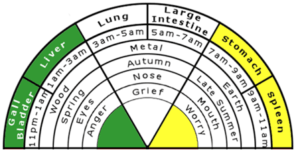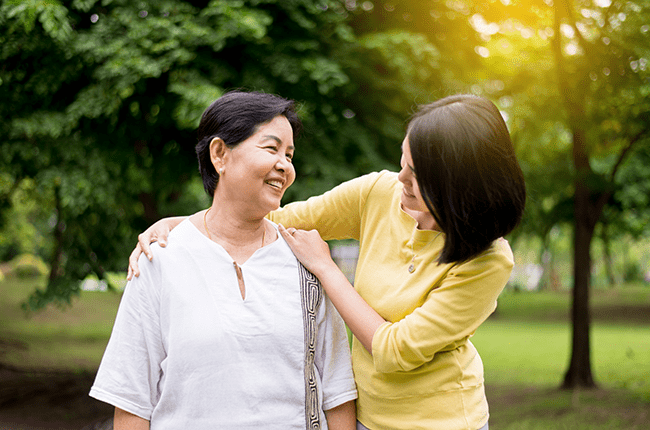As per a study published in the journal Nature Communications a 25-year long study of 7959 British adults revealed that there was also a 30 percent increased dementia risk in those with consistently short sleeping patterns.
Every night, most people enter a unique state of consciousness we call sleep. After a good night sleep, we wake up feeling refreshed physically and mentally, and perform better throughout the day.
But what is really happening inside the body when we sleep and what is the impact of not having enough sleep?
According to the National Sleep Foundation, we are 12% more likely to die prematurely if we don’t get the recommended 7-8 hours of sleep every night.
Why is this the case? Let’s look at our internal body organ clock between 11pm to 11am – this refers to how our organs are functioning while we are asleep.

Source: Byron Bay Detox Retreat
What Is Our Internal Body Clock?
In Traditional Chinese Medicine (TCM), our gallbladder, liver, lungs, and large intestine function differently throughout the day. Therefore, being in deep sleep during specific hours allows these key organs to cleanse and repair themselves, which is crucial for keeping our bodies healthy.
The Different Stages of Sleep
Sleep is regulated by our circadian rhythm or body clock that runs constantly, cycling between alertness and sleepiness. This body clock responds to light signals from the eye’s retina.
At night, the brain receives signals that it is dark and thus ramps up the production of the hormone melatonin, which makes us sleepy. The opposite occurs during the day where the brightness of the environment signals our brain to suppress melatonin production.
As you may be aware, sleep consists of 4 stages that cycle throughout the night.
Stages 1 and 2 are known as non-REM (Rapid Eye Movement) sleep, or in simpler terms, light sleep. This is the transition from being awake to falling asleep. Our heart rate, breathing, and eye movements begin to slow. Muscles start to relax and brain activity slows down.
Stage 3 is known as the first stage of deep sleep. In this stage, our heartbeat and breathing slow to their lowest levels, muscles are relaxed and brain waves slow down further. At this point, our cells produce the most growth hormones necessary for bone and muscle repair, allowing the body to heal itself as we sleep.
Stage 4 is better known as the REM stage. This is the stage where dreams occur. It is characterised as the stage where our eyes, although closed, move rapidly from side to side. Rate of breathing may increase and become irregular, and heart rate and blood pressure increase as well. Our body’s muscles become temporarily paralysed, so that we do not physically act out our dreams. The brain is most active during this stage.
What Happens To Our Body As We Sleep?
According to Carl W. Bazil, MD, PhD, the Caitlin Tynan Doyle Profesor of Neurology at Columbia University Medical Center, the brain is one of the most active parts of the body during sleep.
There are pronounced changes in the electrical activity of the brain during sleep as a result of the brain’s trillions of nerve cells rewiring themselves. He explains that this rewiring is how we process and are thus able to retain new information we may have learned throughout the day.
Evidence suggests that pulling an all-nighter trying to learn new concepts, and consequently missing a few hours of sleep, causes the brain to not be able to retain the information as efficiently as it would have if we had gotten sufficient sleep. “Your brain really needs to process that information, which you really only do when you’re asleep.”, Bazil says.
Apart from the brain, the rest of the body also goes through important changes as we sleep.
During sleep, an increased amount of growth hormones is released – for children specifically, this is when their bodies are able to grow. For everyone else, this is the time when our skin cells regenerate and hair grows longer. Kidney functions slow down and muscles are able to repair the damage from regular wear and tear from day-to-day use.
While we sleep, the body releases a protein called cytokines, which targets infection and inflammation, creating an immune response. Our body also produces white blood cells, which play a critical role in combating infectious diseases. This means that getting sufficient sleep nightly is important in strengthening our body’s immune system.
Humans spend about a third of their lives asleep. However, with modern lifestyles, stress, and the rapid growth of technologies, people are sleeping far less today than they were in the past.
Research has shown that getting less than 7-9 hours of sleep a day or having a poor quality of sleep is associated with an increased risk of disorders that could reduce life expectancies. These include cardiovascular disease, diabetes, depression, and obesity.





